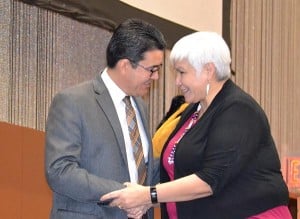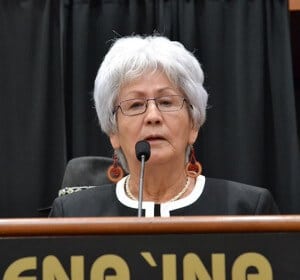AITRC will help manage subsistence hunts

It took 45 long years, but Ahtna shareholder-owners now may have a greater say in how moose and caribou are managed on our traditional lands.
A pilot program announced in December by Department of Interior (DOI) Deputy Secretary Michael Conner allows the Ahtna Intertribal Resource Committee (AITRC) to cooperatively manage the subsistence moose and caribou hunt on federal land for tribal members. It also creates a local advisory committee and formalizes a bigger role for local communities in federal wildlife-management decisions. Many of the implementation details of the program will need to be worked out over the next months and years, but the agreement is a historic step in the right direction.
The signing of the agreement comes on the heels of the two statements made by U.S. Department of the Interior Secretary Jewell Sally` at the Alaska Federation of Natives (AFN) Conference in October. She announced the release of Secretarial Order No. 3342, requiring the Interior Department’s agencies to include tribes in the management of federal lands and resources where possible. The Interior Department’s agencies include the National Park Service, Bureau of Land Management, Fish and Wildlife Service, Bureau of Ocean Energy Management and Bureau of Reclamation.
“The announcement comes at a time when we expect to see food shortages in our region due to weak salmon runs and a substantial increase in competition for limited game resources, such as moose and caribou,” said Ahtna Chairman Nicholas Jackson. “The state-managed moose hunt permits a take of 100 moose, with over 3,000 hunters in the Ahtna region and no assurance that the Ahtna people will have enough customary and traditional foods. Something must change and this directive is a step in the right direction.”
The directive does not make tribes co-managers, but instead requires federal land managers to consult with tribes and develop new ways to make Native people partners in managing fish and wildlife, cultural sites, plant collection and public information.

The need to protect the subsistence hunt for Ahtna’s people was acknowledged by both the state and federal governments.
“As Alaska’s population has grown, the Ahtna people have borne the brunt of increasing hunting pressure on their traditional lands because these areas are fairly accessible to much of the Railbelt region, home to 70 percent of Alaska’s population,” said DOI’s Connor. “This agreement is an effort to help preserve their traditional way of life, put food on the table and improve wildlife habitat and populations for everyone.”
“Ahtna has long-standing concerns about the rules governing the subsistence hunt,” Gov. Bill Walker said. “It is encouraging to see DOI engaging with Ahtna and its tribes and exercising the flexibility provided by federal law to address those concerns.”
The Ahtna Cooperative Management Demonstration Project is the first cooperative agreement established nationwide under the new DOI order. It recognizes that tribes have special geographical, historical and cultural connections to federal lands and waters, and that tribes have traditional ecological knowledge and practices regarding resource management that have been handed down through generations. It was established for the benefit of healthy ecosystems, wildlife populations, the Ahtna traditional way of life and all those that wish to enjoy the federal lands that lie within Ahtna’s traditional territory.
“The DOI and AITRC share mutual concern for conservation of healthy wildlife populations and their habitats, as well as ensuring sustainable and sufficient harvests for customary and traditional subsistence uses,” said AITRC Board Chair Christopher Gene. “The ability of our people to pass down traditional knowledge and customary practices from generation to generation has allowed us to thrive for thousands of years. We are very thankful for the work of Secretary Jewell and Deputy Secretary Connor and their staff to make sure our traditional ecological knowledge and customary and traditional management practices are heard and represented.”
“This kind of collaboration with tribal nations can help ensure that we are appropriately and genuinely integrating indigenous expertise, experience and perspectives into management of federal lands and waters,” Jewell said.
Rural Alaskans in the Ahtna region who are not tribal members will continue to hunt on federal lands under the Federal Subsistence Management Program as before and will not be affected by the agreement.
“The practical impact on other Alaska hunters would be minimal since the amount of moose, caribou and other wildlife resources necessary to meet Ahtna’s needs is only a small percentage of the total take of wildlife within Ahtna’s traditional territory,” said Chairman Jackson. “Moreover, AITRC intends to increase the current moose population through enhancement of habitat on Ahtna lands.”
Federal lands in the Ahtna region include portions of Denali National Park and Preserve, Wrangell St. Elias National Park and Preserve, Tetlin National Wildlife Refuge and scatted Bureau of Land Management lands around the Richardson and Denali Highways.

A historic first for tribal rights
We recognize that the hunting pressure and fierce competition that the Ahtna communities experience to provide moose and caribou for their families on traditional lands has been challenging.”
– Interior Secretary Sally Jewell
“Our hope is that it can provide a model for other tribes to adopt.”
– Ahtna President Michelle Anderson
“It’s a momentous occasion.”
– AITRC Executive Director Karen Linnell
“This agreement is an effort to help preserve their traditional life …”
– Deputy DOI Secretary Michael Conner
“Ahtna has long-standing concerns about the rules governing the subsistence hunt.”
– Gov. Bill Walker
“The ability of our people to pass down traditional knowledge and customary practices … has allowed us to thrive for thousands of years.”
– AITRC Board Chair Christopher Gene
